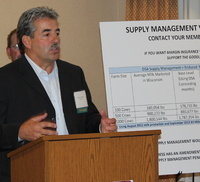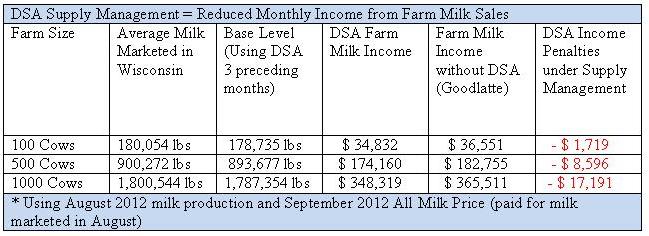
Dozens of dairy farmers from Wisconsin, Kentucky, Michigan, Minnesota, Indiana, Pennsylvania, Ohio and New York spoke during a press conference organized by the Wisconsin Dairy Business Association, an industry organization comprised of dairy producers, processors, corporate and allied industry supporters.
The farmers noted the potential impacts of the controversial provision in the Dairy Security Act known as the Dairy Market Stabilization Program (DMSP). Farmers who want to participate in the margin insurance program would have to agree to participate in the DMSP. Under the DMSP, the government would periodically impose limits on milk production. Studies show that If this program had been effect this year, dairy farmers either would have had to decrease production beginning in May or pay a stiff penalty.
The Wisconsin Dairy Business Association presented the following table outlining the potential impact of the stabilization program on Wisconsin.

John Pagel of Pagel’s Ponderosa Dairy in Kewaunee, Wis., said that a deduction of four percent to eight percent would have a huge impact on his bottom line.
Jerry Meissner, president of the Board of Directors for the Wisconsin Dairy Business Association and owner of Norm-E-Lane, Inc., a 2,000-cow operation, noted that dairy farmers in Wisconsin could have been penalized up to $18,000 had this program been in effect now.
A bipartisan compromise amendment proposed by Representatives Bob Goodlatte (R-VA) and David Scott (D-GA) would remove the stabilization provision. It also would provide dairy farmers with the ability to obtain margin insurance, with catastrophic coverage, as a risk management tool for times of low milk prices and high feed costs, which they are experiencing now. The amendment is expected to be offered and voted upon when the full House considers the Farm Bill, likely in the lame duck session that will begin in November.





